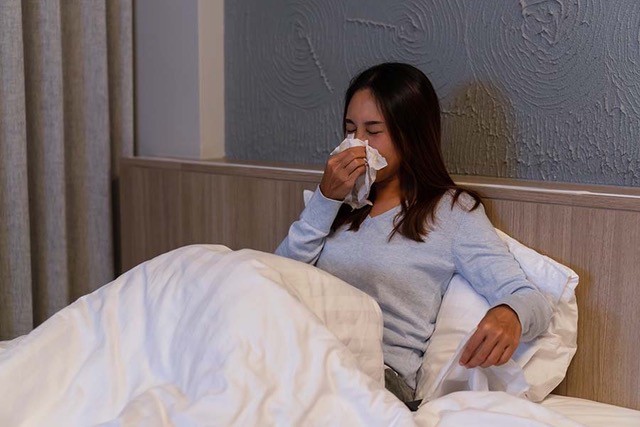With review and feedback from CEENTA ENT doctor Roy Lewis, MD (Mooresville)
You work hard to keep your allergy symptoms under control, but every night when you go to bed, they only seem to get worse. Are your allergies really more serious at night?

Dr. Roy Lewis
Is congestion worse at night?
First, congestion in general can increase at night. Mucus pools in your head and is more difficult to drain when you’re lying down. Also, tissue in your nasal cavities tends to swell more, particularly when inflamed.
Are my allergies worse, too?
While your symptoms may make it tougher to breathe at night, it’s not because your allergies themselves are getting worse. Instead, you’re almost certainly exposed to more allergens overall.
How pollen allergies affect your sleep
If you’re allergic to pollen, you might think you’d be safe from sneezing and congestion by sleeping indoors. However, if you leave your windows open, you’re giving pollen a perfect entrance into your house. Also, pollen collects on your clothes and in your hair during the day, so when you lie down, you’re transferring it to your bedding. If you have an outdoor pet, they could also track pollen into the house and into your bed, especially if they get to sleep in yours.
How dust allergies affect your sleep
Dust mite allergies are very common, as dust mites can live in your mattress and bedding. Carpets and heavy curtains can also be areas where dust mites thrive. Unlike seasonal allergies, dust mite allergies can be perennial (occur all year long).
How mold allergies affect your sleep
Mold allergies are also perennial, and if your home is too humid, it could cause mold to grow.
How pet allergies affect your sleep
Not only can pets drag pollen into your bed, but you could be allergic to them, too. Even hypoallergenic animals can cause allergies.
How can I prevent nighttime allergies?
Avoidance and preventative measures are your best bet. Keep your windows closed, especially in your bedroom, and try to rinse off any pollen and change your clothes before bed. Try to keep your pets out of your room. Keep your mattress and pillowcase enclosed in mite-proof casing. Make sure humidity levels are appropriate, and clean any mold you see right away.
“You can also try sleeping with your head elevated and rinsing your nose with saline daily,” CEENTA allergy specialist Roy Lewis, MD, said. “Also, make sure you’re taking your allergy medicines as directed.”
Allergy care at CEENTA
Come to CEENTA for your allergy needs. We’ll help you breathe easy, day or night.
This blog is for informational purposes only. For specific medical questions, please consult your doctor. New patients can make appointments online with Dr. Lewis or any of our ENT doctors in North and South Carolina. Current patients can also make appointments through myCEENTAchart with physicians they have already seen.
Charlotte Eye Ear Nose & Throat Associates




